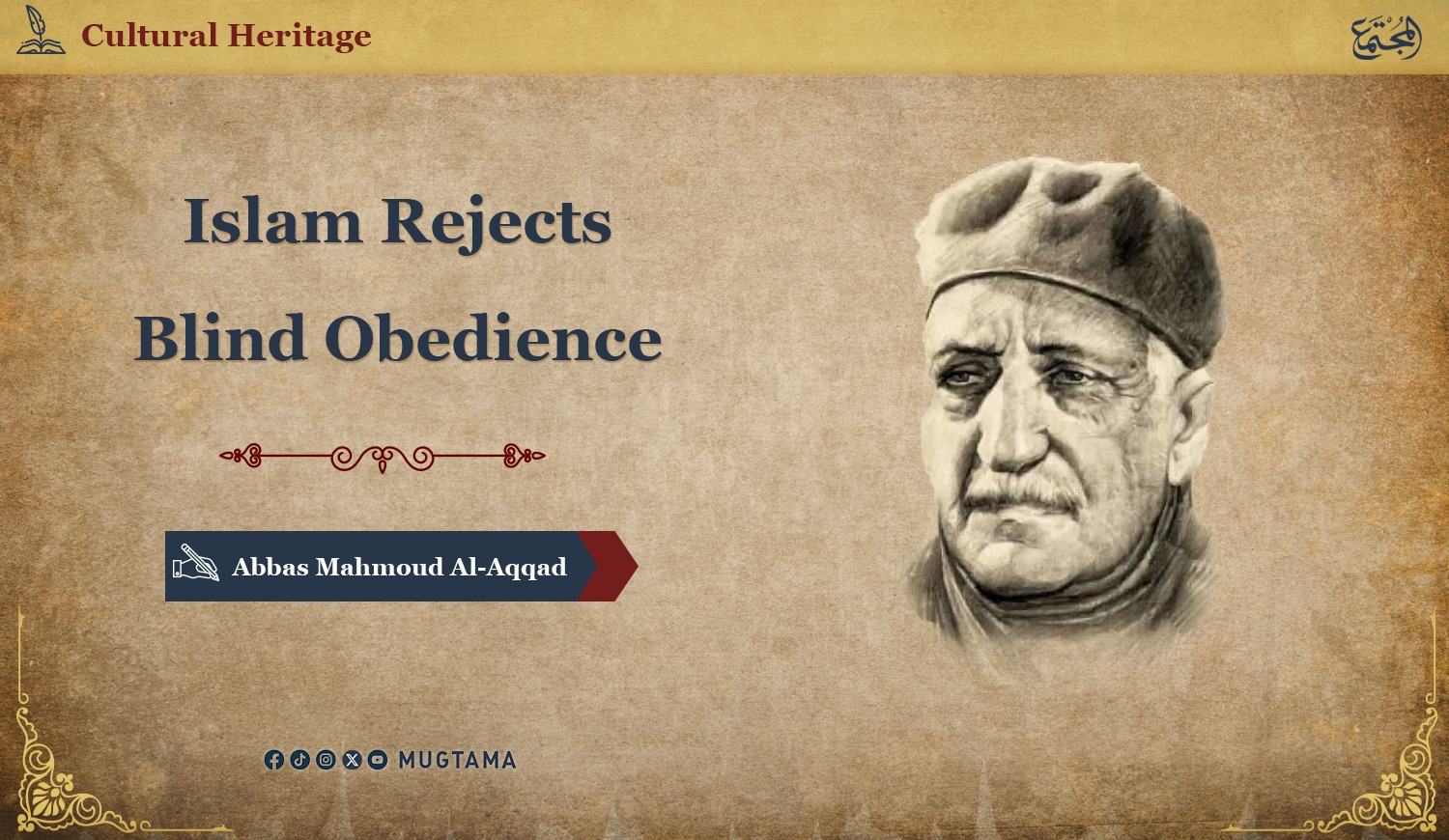Islam Rejects Blind Obedience

When using the mind is among the commands
of the Creator, it becomes impermissible for the created being to suspend his
mind out of seeking the pleasure of another creature like himself, or out of
fear of him—even if that creature is a multitude of people, reinforced by
groups and carried on through generations.
Three Major Hindrances
The hindrances that obstruct the mind from
this angle are many. The Qur’an has enumerated them just as it has enumerated
the mind’s functions and faculties. Yet, they may be gathered into three major
hindrances, the root causes from which all the others branch out. Whoever is
protected from these will most likely be protected from every hindrance that
shackles his intellect and blocks his thought, preventing him from finding
guidance beyond it.
The greatest obstacles in the path of the
intellect are:
·
The worship of
forefathers expressed as custom
·
The blind imitation of
religious authorities
·
The humiliating fear of
worldly powers.
Islam’s Refusal to Cancel Reason
Islam does not accept from a Muslim that he
should annul his reason in order to follow the way of his fathers and
grandfathers. Nor does it accept from him to nullify his intellect in
submission to those who exploit him in the name of religion in matters that are
neither sanctioned by reason nor religion. Nor does it accept that he should
cancel his judgment out of dread of the might and tyranny of the powerful. And
it does not burden him with what is beyond his capacity in these matters, for
the Qur’an repeats in many places that Allah does not burden a soul with more
than it can bear, and He only requires from His creation what is conceivable.
·
“…No soul
shall have a burden laid on it greater than it can bear…” (Al-Baqarah 2:233)
·
“…We do
not charge any soul except [according to] its capacity…” (Al-An‘am 6:152,
Al-A‘raf 7:42)
·
“…We
charge no soul except [with that within] its capacity…” (Al-Mu’minun 23:62)
·
“Allah
does not charge a soul except [with that within] its capacity. It will have
[the consequence of] what [good] it has gained, and it will bear [the
consequence of] what [evil] it has earned. “Our Lord, do not impose blame upon
us if we have forgotten or erred. Our Lord, and lay not upon us a burden like
that which You laid upon those before us. Our Lord, and burden us not with that
which we have no ability to bear…” (Al-Baqarah 2:286)
The Courage of Reason
No one who is guided by reason can fail to
see the truth and abstain from falsehood. If compelled to abandon truth and
commit falsehood, he still has the capacity to save himself from such coercion
wherever possible. And if he is prevented from escaping, he can at least bear
the harm that befalls him at the hands of those who trample his dignity and
kill his conscience. That, no doubt, is the lesser of two evils. For there is
no meaning to religion or morality if people fear harm to their bodies but do not
fear the greater harm that descends upon their souls and consciences, dragging
their eternal life below the level of a life that neither endures nor possesses
honor or nobility.
Why These Hindrances Remain
All these hindrances—custom, blind
obedience, and servile fear—only exist and remain when man consents to live
without reason in the most noble of his human pursuits: the integrity of his
conscience. But they vanish the moment he returns to his intellect in the face
of any of these obstacles. It may indeed be difficult for him to overcome or
confront them, but the right of reason upon him necessitates endurance, for
such hardship is far lighter than losing his supreme faculty and sinking into a
life without reason—or a life that reasons, but prefers baseness despite
knowing what is higher.
Tyranny of Custom in Jahiliyyah
In Islam, the right of reason is measured
against the power of these hindrances which lie in wait for it, seeking to
block its path. The foremost of these in the early days of Islam was the
authority of custom—or the “worship of forefathers”—for in the Age of
Ignorance, custom had attained the status of worship in its reverence,
dominance, and enslavement of souls by the dictates of tradition. In reality,
it was nothing less than a form of worship that ruled man in all his times and
relations, sometimes more than religious rites themselves. Indeed, in the
pre-Islamic eras, religious rites derived much of their force only from their
rootedness in custom.
The Islamic call greatly angered the people
of Jahiliyyah and incensed them against the Messenger (PBUH). What most enraged them in his message was that it
belittled the beliefs and ways of their forefathers. Rarely did they accuse him
of mocking their own minds; rather, their outrage was always centered on his
saying that he mocked the ways of their ancestors, declaring their noble
lineage misguided and their ancestors devoid of understanding in matters of
religion.
Islam’s Call to Intellectual Freedom
When Islam refuses to allow man to submit
his entire mind to this overwhelming force of tradition, it is in fact granting
reason its right to resist it. And it does not stop at imposing the duty of
resistance, but also equips him with the argument to aid him in his struggle,
where otherwise he would stand defenseless. It commands him and supports him;
it stirs him and places in his hand the weapon sharpened for his revolt. Thus,
it is a helper and ally, laying the burden while also providing the means of bearing
it.
So when Islam says to man: “You must open
your eyes and not follow blindly into destruction,” it is as if it is saying:
“You have the right to look into your own affairs—indeed, into the greatest
affair of your life—and your forefathers have no right to make you a submissive
victim to the ignorance they lived upon.”
No Excuse for Blindness
Islam refuses to let a man excuse himself
by appealing to the ways of his fathers, just as it refuses that he should bear
the sins and errors of those forefathers. It rebukes those who listen to the
message but absolve themselves of the duty of thought by clinging to inherited
beliefs devoid of reason. “And when it is said
to them, “Follow what Allah has revealed,” they say, “Rather, we will follow
that which we found our fathers doing.” Even though their fathers understood
nothing, nor were they guided?” (Al-Baqarah 2:170).
-------------------------------------------------------------
Read Also:
· Colonizing
Souls, Culture and Land
· Book
Review: “The Phenomenon of Conflict Between Individualism and Collectivism in
Western Thought”











